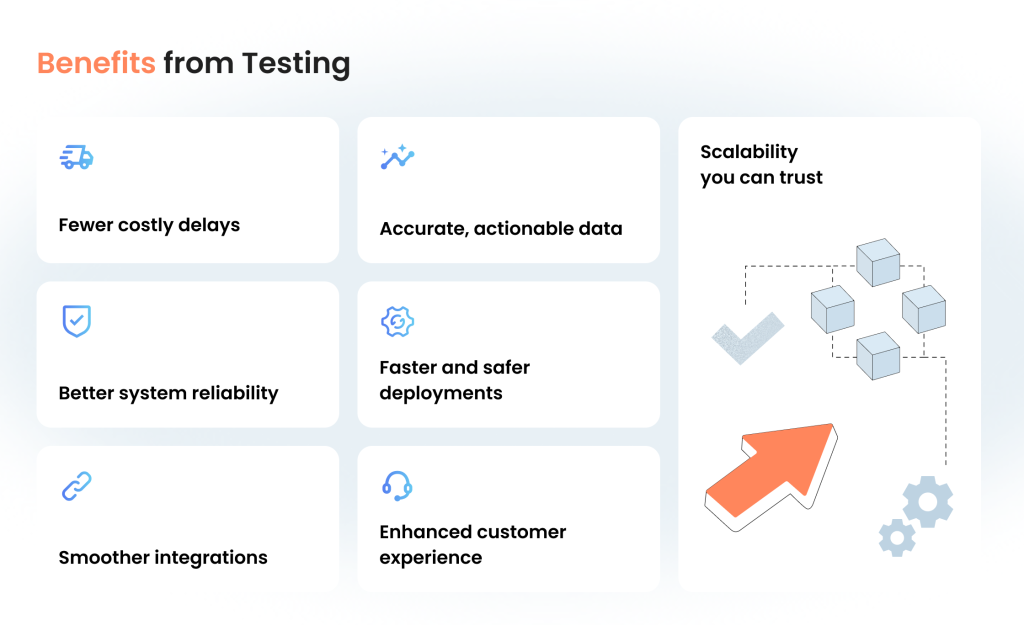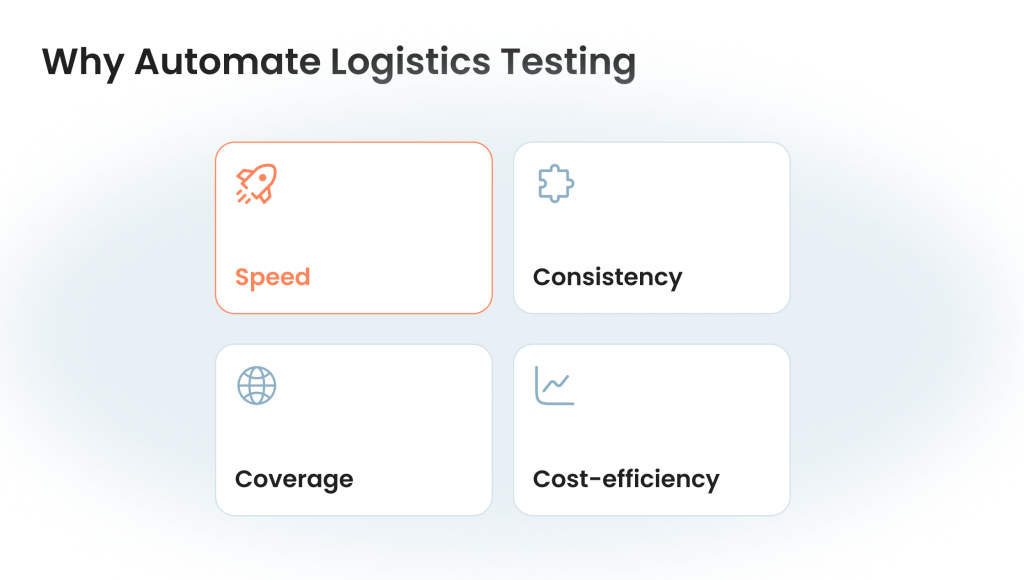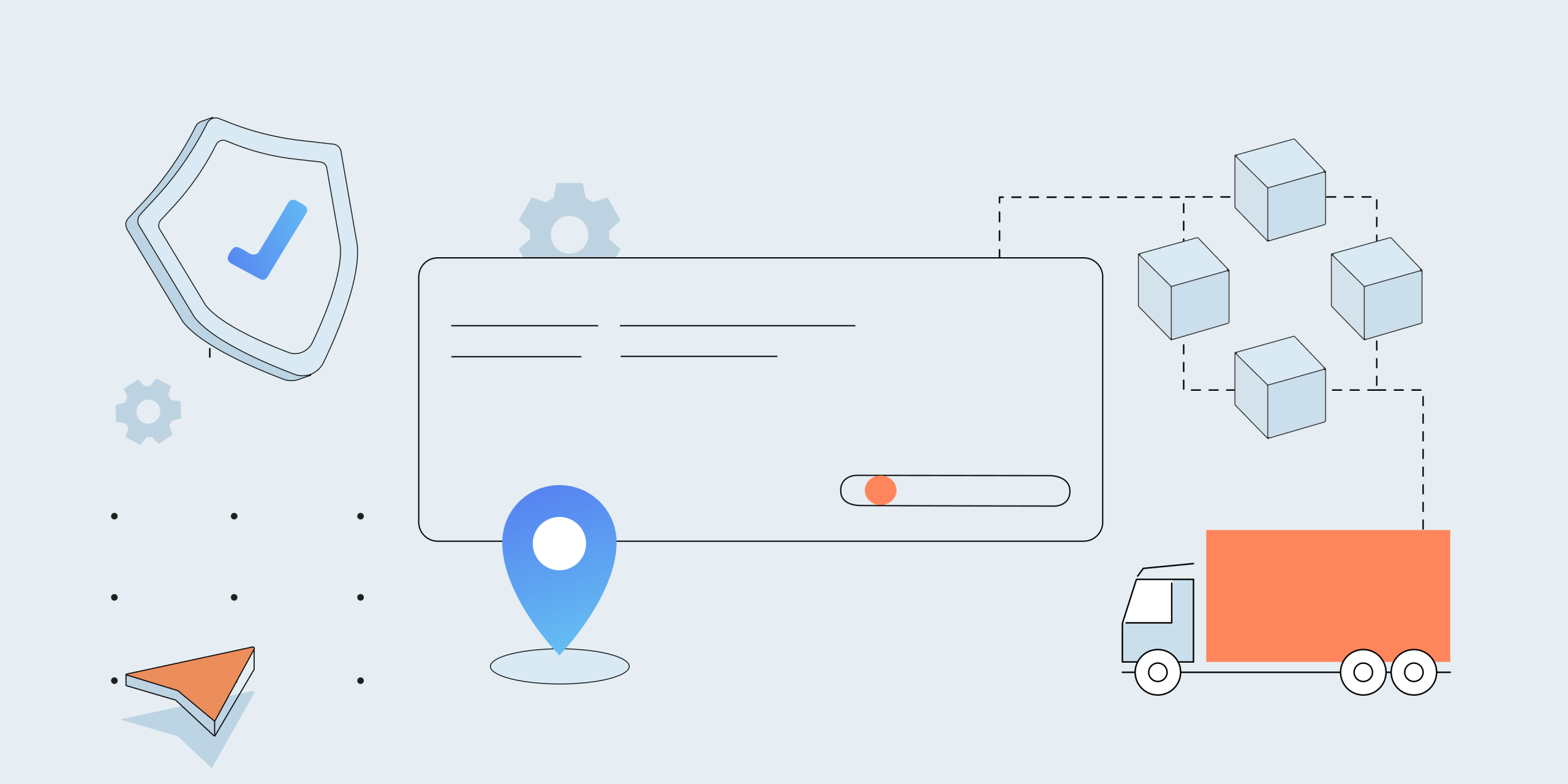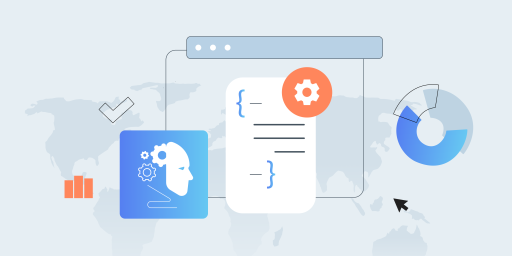Behind every successful delivery is a complex network of software systems working together in real time, from route planning and inventory tracking to payment processing and mobile apps for drivers. In an industry where delays, errors, or downtime can mean lost revenue and customer trust, logistics software must be fast, reliable, and secure.
However, ensuring impeccable quality of dynamic logistics software is no small task. With multiple integrations, constant data flows, and critical functionality, logistics systems require in-depth, ongoing testing. Find out why logistics software testing is more important than ever, what needs to be tested, and how a strategic approach to quality assurance can improve performance, scalability, and customer satisfaction from our article.
Why Logistics Software Testing Is More Important Than Ever
Logistics has become a high-tech, data-intensive industry. While the physical movement of goods still matters, it’s the software behind the scenes that determines whether operations run smoothly or break down. As logistics systems grow more complex, testing becomes critical not just for quality, but for business survival.
The rising complexity of logistics systems
Modern logistics environments involve a wide mix of technologies:
- Legacy platforms still in use alongside new cloud-native tools
- Multiple integrations with ERP, CRM, warehouse management, and transport systems
- APIs for real-time tracking, customs declarations, and partner coordination
- Mobile apps and portals for drivers, dispatchers, and customers
Each of these elements introduces dependencies. A small issue in one area, such as a faulty update to a routing API, can deliver impact across the entire ecosystem.
High expectations, low tolerance for failure
Given how much variety there is in the logistics industry, users are no longer going to be satisfied with subpar software applications. Customers now expect:
- Real-time delivery updates
- On-demand services and flexible shipping options
- Seamless digital experiences across devices
To meet these expectations, logistics companies need software that performs flawlessly under pressure. But with frequent releases and ongoing digital transformation, it’s easy for undetected bugs to slip into production, unless there is a robust testing process in place.
Continuous change drives continuous risk
Logistics companies are in constant motion:
- Migrating to the cloud
- Rolling out new features
- Expanding into new regions
- Onboarding new partners
Each change introduces potential risks that must be managed across different environments, data sets, and user types. Without testing or with inadequate testing, businesses face delays, outages, compliance violations, and lost revenue.
Testing isn’t a bottleneck — it’s the central element
In fast-paced logistics operations, quality assurance isn’t a “nice-to-have.” It’s what keeps systems responsive, secure, and scalable. Testing is as important for logistics as development. The goal isn’t to slow down innovation — it’s to make sure it doesn’t break everything else.
Logistics domain testing has shifted from being reactive to proactive. Today, it’s foundational to delivering reliable services, maintaining customer trust, and staying competitive in an increasingly dynamic market.
Keep your logistics system fast, secure, and reliable — our QA expertise is here to help you
How Does the Logistics Industry Benefit from Testing?
Logistics software testing isn’t just about catching bugs — it’s about enabling smoother operations, lower costs, and better service. Here’s how quality assurance directly supports logistics businesses.
Fewer costly delays
Testing identifies issues before they disrupt order processing, routing, or shipment tracking. This reduces downtime, delivery errors, and customer complaints.
Better system reliability
Through QA involving activities like performance testing and load testing, owners can ensure that critical systems — like inventory management or driver dispatch — stay stable even under heavy load or during updates.
Smoother integrations
Testing confirms that your software works well with third-party systems, APIs, customs platforms, and payment gateways, preventing breakdowns and disruptions in the supply chain.
Accurate, actionable data
With test coverage for data validation and transformation logic, businesses can avoid bad analytics and poor decision-making caused by inconsistent or outdated data, meaning that software systems can get the necessary updates and improvements.
Faster and safer deployments
Automated tests help teams release updates quickly while minimizing risks. QA helps catch bugs early and supports CI/CD practices in logistics environments, speeding up the overall software development process, allowing you to release with confidence even under tight deadlines.
Enhanced customer experience
From shipment notifications to self-service portals, well-tested interfaces improve usability, reduce user frustration, and build trust with clients and end-users.
Scalability you can trust
As your traffic grows or your business expands to new markets, QA ensures your infrastructure and applications scale reliably, without performance disruptions, delayed deliveries, and other unwanted outcomes.
What Happens Without Quality Assurance in Place
Timely testing exists to improve the quality, efficiency, and productivity of logistics and transportation software, as well as meet the needs and expectations of the users better. Without QA, on the other hand, logistics companies take on significant risk — not just technical, but operational and reputational. Here are the other consequences you can face when you don’t take the time to fully test software prior to the release.
Disconnected operations
Without proper testing, apps and systems may not communicate effectively. That means warehouse systems might not reflect transport updates, or customer portals could show outdated delivery statuses.
Chaotic releases
Deployments often break something, especially in logistics ecosystems with legacy components, which includes most systems running today. QA reduces post-release bug correction, whereas without it, development becomes a cycle of rushed fixes.
Vulnerabilities go unnoticed
Security testing is critical in environments handling sensitive shipment data and third-party integrations. Without it, the system becomes an easy target for cyber threats or compliance violations, which can tarnish the brand’s reputation beyond repair.
Innovation stalls
Teams hesitate to introduce new features or scale operations when they’re unsure of software stability. A lack of QA creates fear of change and slows progress, causing the team to delay software updates and further frustrate the stakeholders.
Missed business opportunities
Unstable platforms or buggy customer tools can damage partner relationships, causing lost contracts or failed bids. Reliability is a key differentiator in logistics tech, helping improve business operations and increase the brand’s appeal.
Your logistics software is critical.
Let us help you test it right.Discuss a project
Focus Points: What Needs to Be Tested in a Logistics System
Logistics software touches nearly every part of the supply chain. This means that each area introduces unique testing priorities and potential issues that might cause discrepancies and errors across the pipeline. Here are the key aspects of software systems that end-to-end logistics QA testing typically focuses on.
Order and shipment management
Teams use testing to ensure the accuracy of order processing, inventory status, dispatch workflows, and real-time shipment tracking under various real-world scenarios and data volumes.
Route planning and optimization
Test cases here focus on calculation accuracy, responsiveness to dynamic data like traffic or weather, and seamless updates across integrated systems.
Carrier and warehouse integrations
Ensure reliable data exchange between external systems (carrier APIs, warehouse management systems). Here, teams also need to test for edge cases like system outages or partial updates.
User interfaces
Whether it’s internal dashboards or customer-facing portals, it’s important to ensure software usability, responsiveness, localization, and accessibility across devices.
Data handling and reporting
Here, the team will verify the accuracy, integrity, and consistency of data used for business analytics, regulatory reports, and daily operational decisions.
Payment and billing systems
This area of testing is responsible for transaction processing, pricing logic, invoicing accuracy, and compliance with tax rules and international payment standards.
Scalability and performance
To ensure adequate performance in different conditions and situations, the team must simulate peak loads. This includes holiday spikes, new customer onboarding, or international expansion. It helps identify bottlenecks early and avoid service disruptions once a new update is deployed to the live environment.
Security and compliance
To facilitate data safety throughout all business processes, it’s vital to test for vulnerabilities, access control flaws, and compliance with standards like GDPR, SOC 2, or industry-specific regulations like CTPAT (Customs-Trade Partnership Against Terrorism).

Challenges That Logistics Software Testing Solves
Software quality in logistics isn’t just about “does it work?”. It’s also about scale, accuracy, speed, and security in highly interconnected, high-pressure environments. Below are some of the most common and critical QA challenges logistics companies face, drawn from real client experiences and case studies.
1. Legacy systems and complex architectures
Many logistics companies operate on a patchwork of legacy and modern applications, which often leads to:
- Frequent production outages
- Difficulties maintaining quality control across environments
- Scalability limits due to outdated, overly complex architectures
- Challenges in supporting in-flight releases and interdependent deployments
Testing in these environments requires an understanding of both old and new systems, and the ability to validate them as one cohesive unit.
2. Data issues: quality, migration, and consistency
Data is the backbone of logistics, but poor QA practices often lead to:
- Outdated or inconsistent data after poorly managed migrations
- Manual database handling that slows down operations
- Out-of-sync datasets generating inaccurate analytics and customer miscommunication
- The need for testing strategies that validate real-time data integrity at scale
These problems are especially severe when dealing with big data and billions of transactions annually, such as in payment systems or order management.
3. Performance and scalability under pressure
Performance failures in logistics can mean missed shipments, SLA breaches, and lost revenue. Key challenges include:
- Ensuring systems can handle massive transaction volumes under peak load
- Preparing for user base spikes, such as onboarding a large new client
- Verifying system behavior in thousands of performance scenarios or with complex mobile apps
- Compatibility of tools like JMeter for load testing the specific application architecture
Logistics QA must include rigorous performance testing and monitoring to ensure reliability under real-world usage.
4. Release speed and test automation gaps
Fast releases are essential, but they are not worth much without quality. Many companies struggle with:
- Managing frequent updates across numerous parallel projects
- Lack of automated regression and integration testing
- High-maintenance test frameworks that slow down delivery
- The need for CI-integrated automation and low-code system support
Solutions like Cypress-based test automation and synthetic monitoring have proven effective for improving speed without sacrificing stability.
5. Security and compliance concerns
In high-availability, data-driven logistics environments, security can’t be an afterthought:
- Companies need live security audits and penetration testing before the solution goes live
- Identifying and fixing vulnerabilities is essential for customer trust and compliance
- QA must cover GDPR, trade regulations, and IT infrastructure resilience
Security-focused QA ensures systems are both robust and compliant in high-risk environments.
6. Limited in-house QA capacity
Finally, many logistics companies face challenges simply because:
- Their in-house QA teams are overstretched or under-resourced
- They lack the expertise in methodologies and tools for public cloud, mobile, or cross-platform testing
- They need help with daily functional testing, end-to-end testing, and manual testing
Working with a specialized QA partner enables logistics firms to scale quality processes alongside product growth, instead of falling behind.
Don’t let bugs disrupt your supply chain — let’s test before it breaks
Test Automation for Logistics: Benefits and How to Implement It

Frequent updates, massive test data flows, different testing environments, and integrations with numerous third-party systems make the process of logistics system software testing highly complex. Automation helps maintain software quality without slowing down delivery, reducing manual errors and ensuring that critical operations remain uninterrupted. Here is why else you should consider automation:
- Speed. Automated tests execute faster than manual tests, enabling quicker release cycles and helping teams respond to changes or issues without delays.
- Consistency. Tests run the same way every time, eliminating the variability and potential oversights of manual testing and ensuring reliable results.
- Coverage. Automation allows for broader and deeper test coverage, including edge cases and scenarios that are difficult or time-consuming to cover manually.
- Cost-efficiency. While there’s an upfront investment in building automated test scripts, it pays off over time by automating repetitive QA activities, reducing manual effort, shortening regression cycles, and catching issues earlier in development.
What to automate in the first place?
While the benefits of automation are impossible to argue with, it’s also neither feasible nor wise to automate everything. Plus, some aspects of the software, such as the way unrelated customer notifications impact the system’s operations, are best tested manually and on real devices. At the same time, there are areas that are perfectly suited for automation:
- Regression tests for core workflows. Automate frequently used functionalities like order processing, dispatch scheduling, or inventory synchronization to ensure these always work after updates.
- API and integration validations. Verify data exchanges between internal systems (for example, WMS, TMS, and ERP) and third-party services like carriers, customs, and payment processors to ensure seamless operation.
- Performance and load testing. Simulate peak loads to make sure your system can handle real-time processing of large transaction volumes without slowing down or crashing.
- Data integrity checks. Ensure that warehouse and shipment data remain accurate and up-to-date across multiple systems, reducing the risk of misdeliveries or delays.
- Security scan automation. Automate vulnerability scanning and authentication tests to strengthen defenses against data breaches and system intrusions.
How to automate logistics software testing
The testing team must approach an automation process with a clear idea of what they want to achieve in the end and how they are going to get there. Here are a few tips that will help you streamline your automation QA process and get everything you want from it:
- Start small. Choose a stable, business-critical module like order tracking to automate first, allowing teams to build experience with minimal risk. Don’t jump headfirst into automating complex solutions involving IoT or sophisticated sensors.
- Set priorities. Focus on test cases that are time-consuming to run manually, prone to human error, or critical for business continuity.
- Build maintainable scripts. Use modular test structures and follow good coding practices to make your automation framework scalable and easy to update.
- Integrate into pipelines. Plug tests into your CI/CD workflow to automatically validate builds and prevent defects from reaching production.
- Scale gradually. Expand automation coverage based on test insights, team readiness, and product complexity, always validating ROI along the way.
Best Practices and Tips for Logistics QA Testing
When you want to test the system that is used for managing logistics and transportation, it’s important to not just follow a standard sequence of steps, but also include industry best practices that are relevant to your product and domain. Here are 7 expert-approved tips for making the most of your testing process.
1. Test with real-world data samples
Use realistic shipment volumes, delivery routes, and inventory levels to simulate actual operating conditions. This helps uncover edge cases that only occur under production-like loads or geographic diversity.
2. Validate time zone logic
Logistics systems often span countries and continents. Ensure time-based operations like dispatch scheduling, delivery ETA, and cutoff times behave correctly across multiple time zones.
3. Monitor third-party dependencies
Testing shouldn’t stop at your system boundaries. Monitor carrier APIs, payment gateways, and customs systems during integration testing to detect external failures and implement fallback mechanisms.
4. Test for offline and reconnect scenarios
In field operations (like warehouse or delivery apps), network interruptions are common. Validate how your system behaves when going offline and reconnecting, especially for data syncing and order updates.
5. Track and test compliance rules
Different regions enforce unique transport, storage, or customs regulations. Build test cases that validate compliance with laws like temperature tracking for perishables or document handling for cross-border shipments.
6. Use exploratory testing for edge flows
Automation covers the routine, but logistics systems often face non-standard flows (for example, package re-routing or emergency drop-offs). Use exploratory testing to uncover usability or logic flaws in these irregular paths.
7. Test mobile devices in realistic environments
With at least 54% of logistics companies adopting mobile technology, and that number expected to grow significantly in the near future, mobile testing is a must. If your logistics system includes driver or scanner apps, it’s crucial to test on various devices, operating systems, and under conditions like glare, gloves, or moving vehicles.
When to Start Logistics System Software Testing and How We Can Help
Logistics domain testing is a multi-faceted operation that can bring sizable benefits at every stage of the development and deployment process. Here is where software testing makes particular sense for logistics software.
1. During planning and architecture
QA can help identify risks tied to legacy systems, data migration, and scalability. Early involvement allows you to map dependencies, validate feasibility, and catch structural issues that might delay or derail development later on.
2. Before and during integration
When multiple modules or third-party services are about to be integrated — like route optimization tools, payment gateways, or ERP systems — QA ensures that each component functions reliably and securely within the ecosystem.
3. Before major data handling operations
Logistics systems handle vast volumes of real-time data. QA plays a vital role in ensuring data consistency, accuracy, and integrity across systems, especially during migrations or when building analytics pipelines.
4. When scalability is a concern
Whether preparing for peak season, onboarding new enterprise clients, or expanding globally, performance testing can help simulate high loads and prevent slowdowns, failures, or outages.
5. When your team is under pressure
Rapid releases, frequent requirement changes, or QA bottlenecks can overwhelm internal teams. Bringing in external experts helps ensure continuous quality without slowing development.
How we can help
Testing a logistics system in-house can be daunting. These platforms often involve interconnected modules — like inventory, warehouse, transport, ERP, and billing — each with specific performance, compliance, and data handling requirements. Add in third-party integrations, mobile use cases, and real-time data processing, and you’re looking at a highly complex QA challenge. Many internal teams struggle with limited QA expertise, lack of domain knowledge, or pressure to release fast without compromising quality.
That’s where we come in.
With over 20 years in software testing services and extensive experience performing quality assurance for logistics platforms, we understand the business and technical demands of this industry. Our team knows how to build stable testing strategies even in high-pressure, high-complexity environments. We work as a seamless extension of your team, adapting to your processes, timelines, and goals. Whether you’re launching a new system, modernizing legacy infrastructure, or scaling operations globally, we help you do it with confidence and quality.
Here’s how we support your logistics system testing:
- QA strategy development tailored to logistics. We start by assessing your system’s architecture, integrations, and business logic to develop a QA roadmap that matches your goals and operational needs.
- Comprehensive testing across all modules and touchpoints. From warehouse systems to mobile driver apps, we test across devices, interfaces, and environments to ensure reliability, usability, and interoperability.
- Implementation of test automation at scale. We build or extend automated test suites to cover frequent workflows, regression checks, and data validation tasks, saving time and reducing release risk.
- Specialized testing: API, performance, data, mobile, and more. We test APIs and integrations under real-world loads, validate data accuracy across systems, ensure mobile UX consistency, and stress test infrastructure.
- Compliance, security, and failure recovery validation. We ensure your logistics platform is resilient, secure, and compliant with relevant standards like GDPR and ISO, and can recover quickly from system failures or outages.
We will make error-free, reliable, secure logistics software your new normal
Final Thoughts
In logistics, where delays, errors, or inefficiencies are felt across entire supply chains, quality assurance isn’t a luxury — it’s a necessity. As logistics platforms grow more complex, integrated, and mobile-driven, ensuring reliability, security, and scalability becomes a continuous effort. Effective testing gives you control over that complexity and confidence in your system’s performance, even under pressure.
Whether you’re digitizing operations, expanding your service scope, or launching a new product, the right QA partner can make all the difference. With a focused strategy, proven tools, and logistics-savvy testers, we help you keep your systems running smoothly and your customers happy.
Jump to section
Hand over your project to the pros.
Let’s talk about how we can give your project the push it needs to succeed!







